Garlic and Herb Crusted Prime Rib
Updated Aug 30, 2025
Try my easy and fail-proof Garlic & Herb Crusted Prime Rib; it's a delicious centerpiece for your Thanksgiving celebration or special occasion.
This post may contain affiliate links. Please read our disclosure policy.
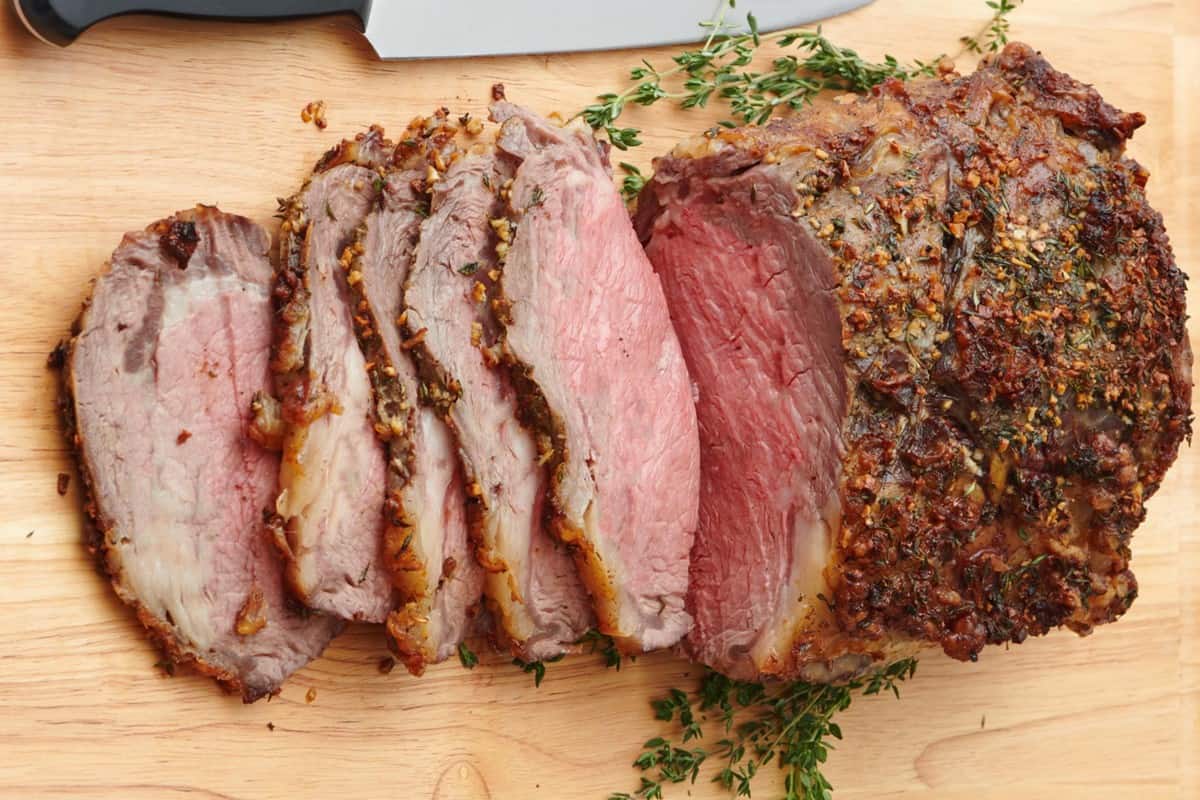
Jump to Section
Don’t be Intimidated By Prime Rib

Prime rib is always a treat, and this Garlic and Herb Crusted Prime Rib is my way of taking a classic to the next level by adding herbed garlic butter, cracked black pepper, and shallots. This is the kind of recipe I’m so proud to serve for a big holiday get-together, but it’s simple enough that I’ve actually made it for Sunday night dinner once and my kids flipped out!
A Christmas prime rib recipe is one of those great traditions because this is a cut of meat that feels indulgent and worthy of a special occasion! Even without any added ingredients, the marbling melts as the prime rib cooks, which creates the most juicy, tender, flavorful prime rib recipe!
Happy Cooking!
– Yumna
Prime Rib Ingredients
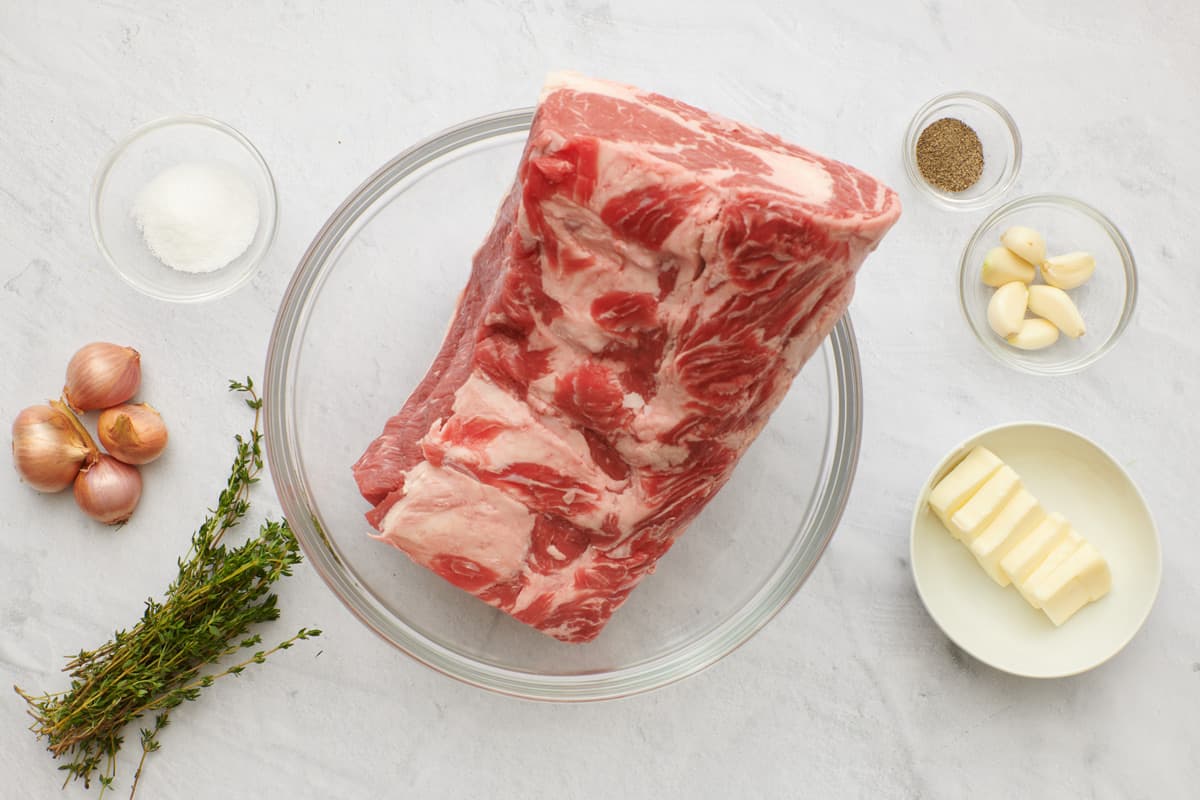
- Rib eye roast: Look for a roast that’s well-marbled. An aged roast is extra tender and flavorful! I prefer boneless, but bone-in is fine as well (though you may need to lengthen your cooking time).
- Salt: I always use kosher salt for this recipe because the large surface area of the flakes dissolves slower into the meat to tenderize it and enhance flavor without making it too salty.
- Butter: Go for unsalted butter if you can!
- Fresh thyme leaves: Look for fresh thyme rather than dried seasoning! You can also swap in rosemary if you prefer.
- Garlic cloves: I love cooking with fresh garlic cloves.
- Black pepper: Freshly cracked black pepper is best, if available.
- Shallots: I prefer shallots for this prime rib recipe, but yellow onion will also work.
How to Make Prime Rib
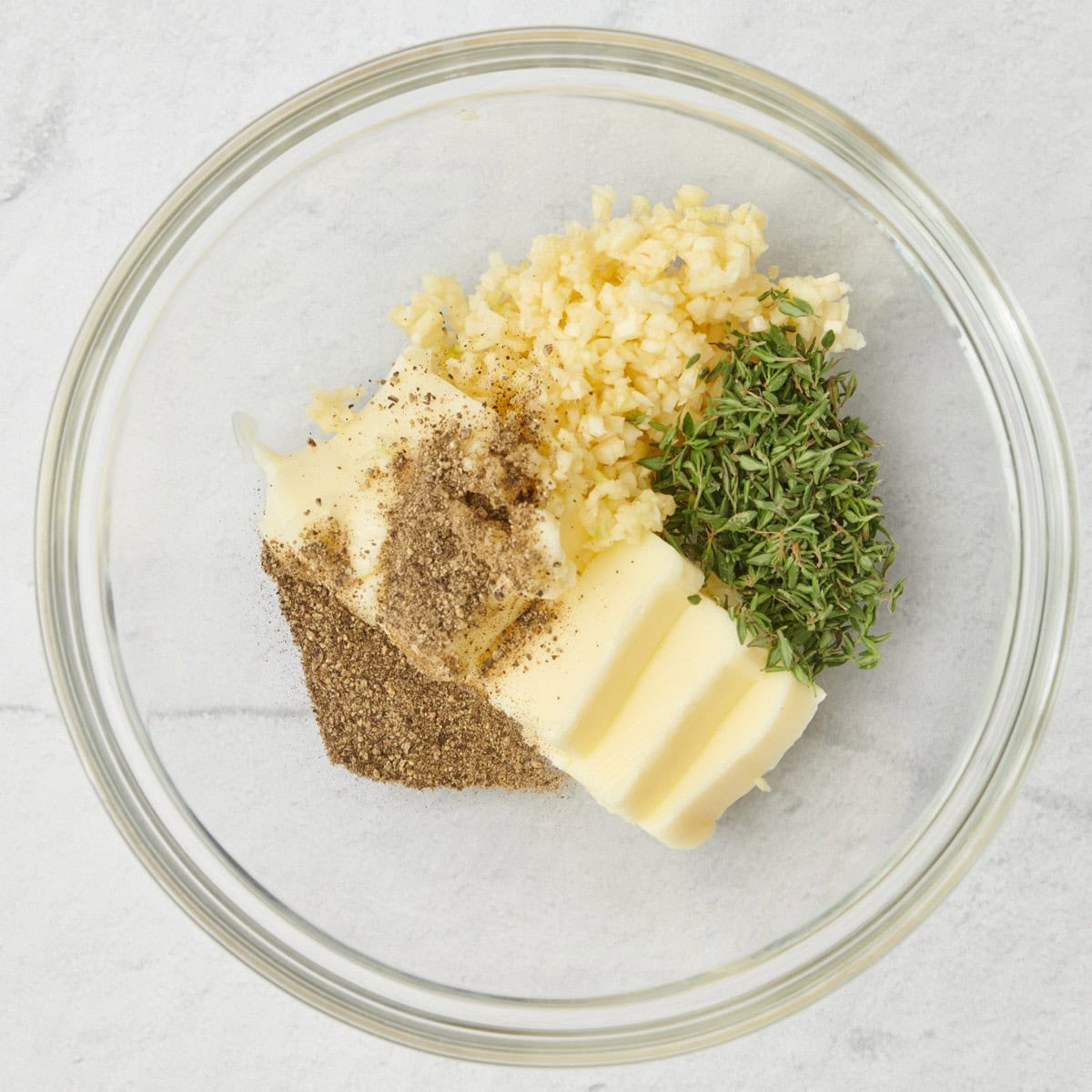
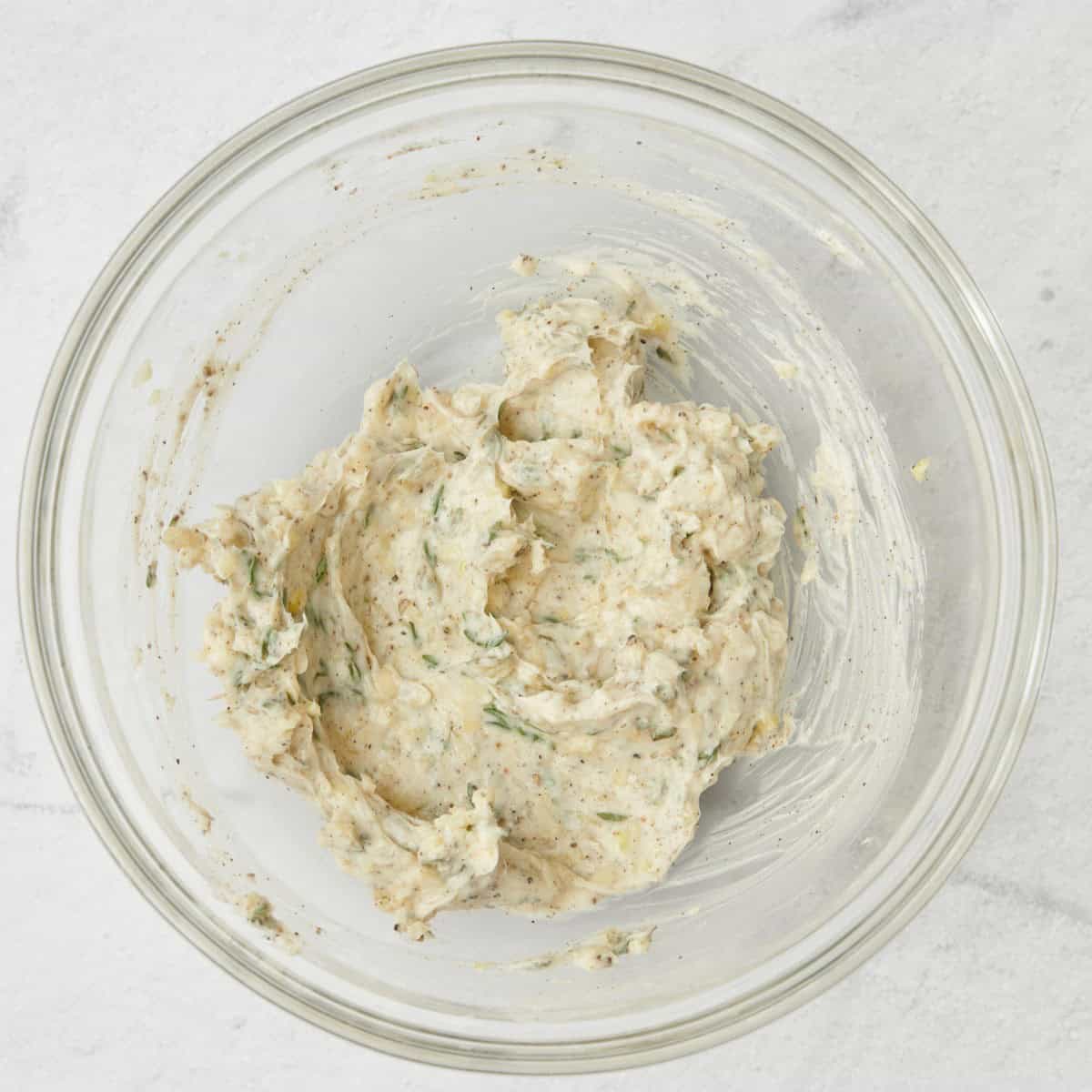

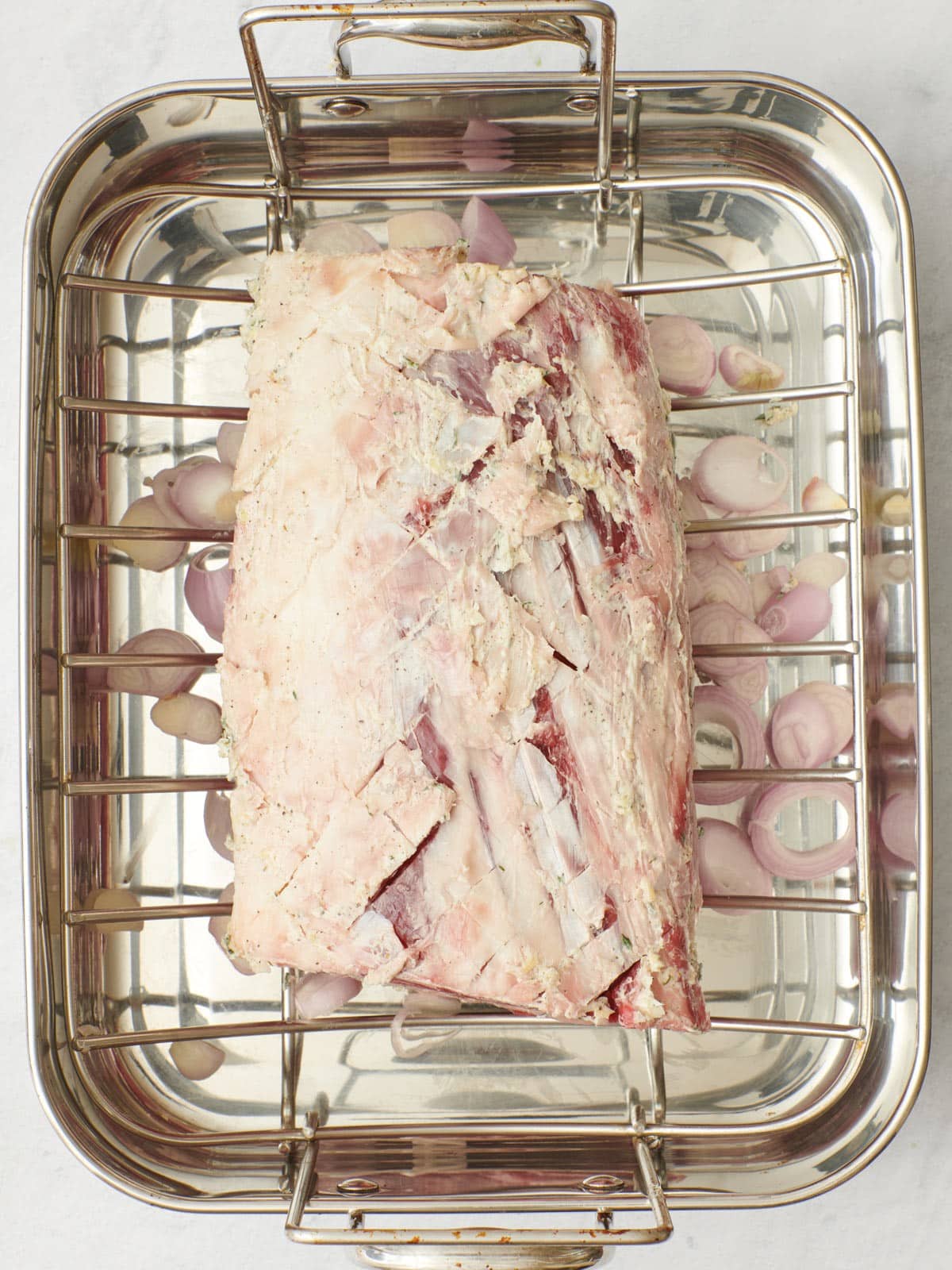
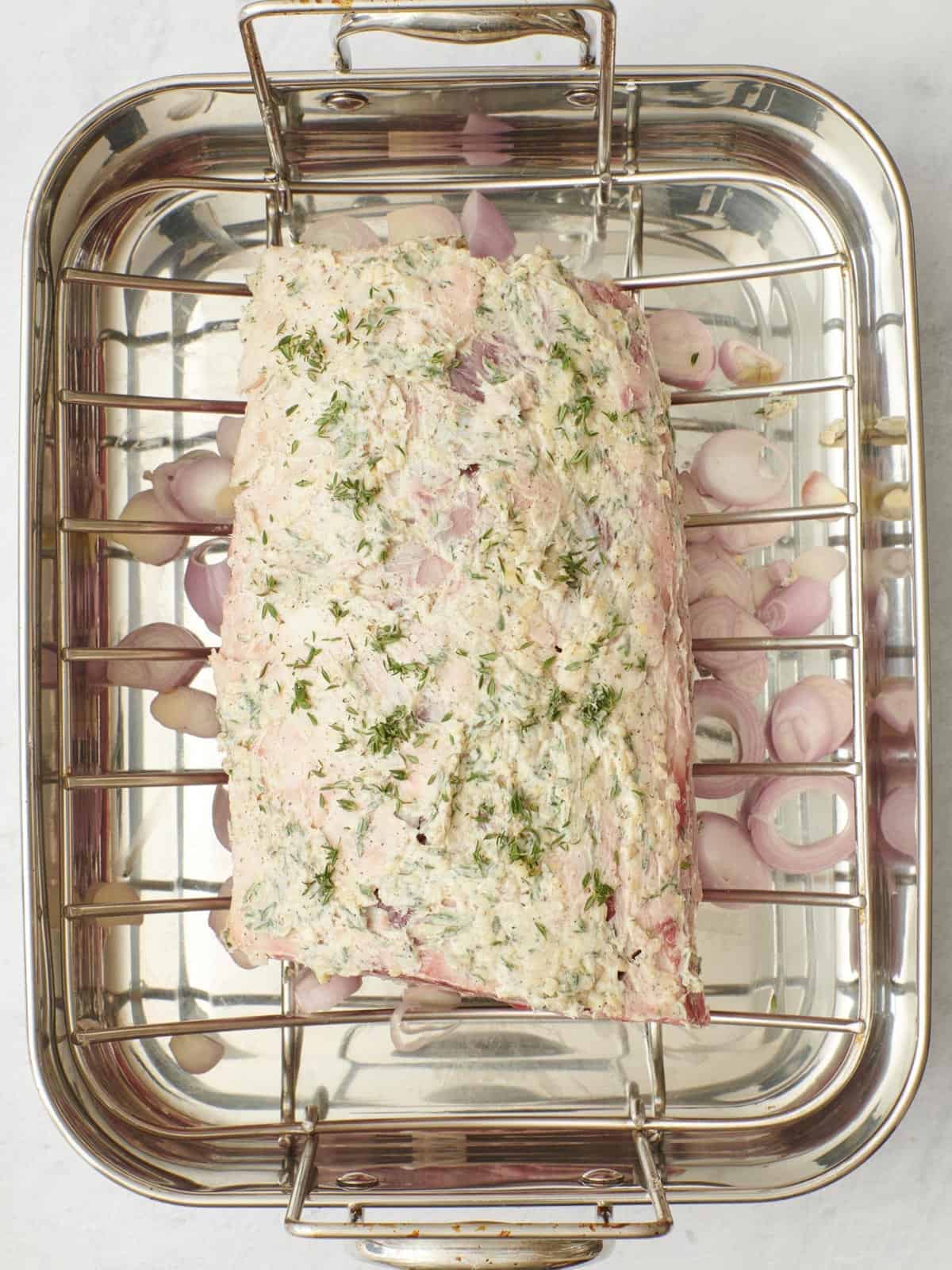
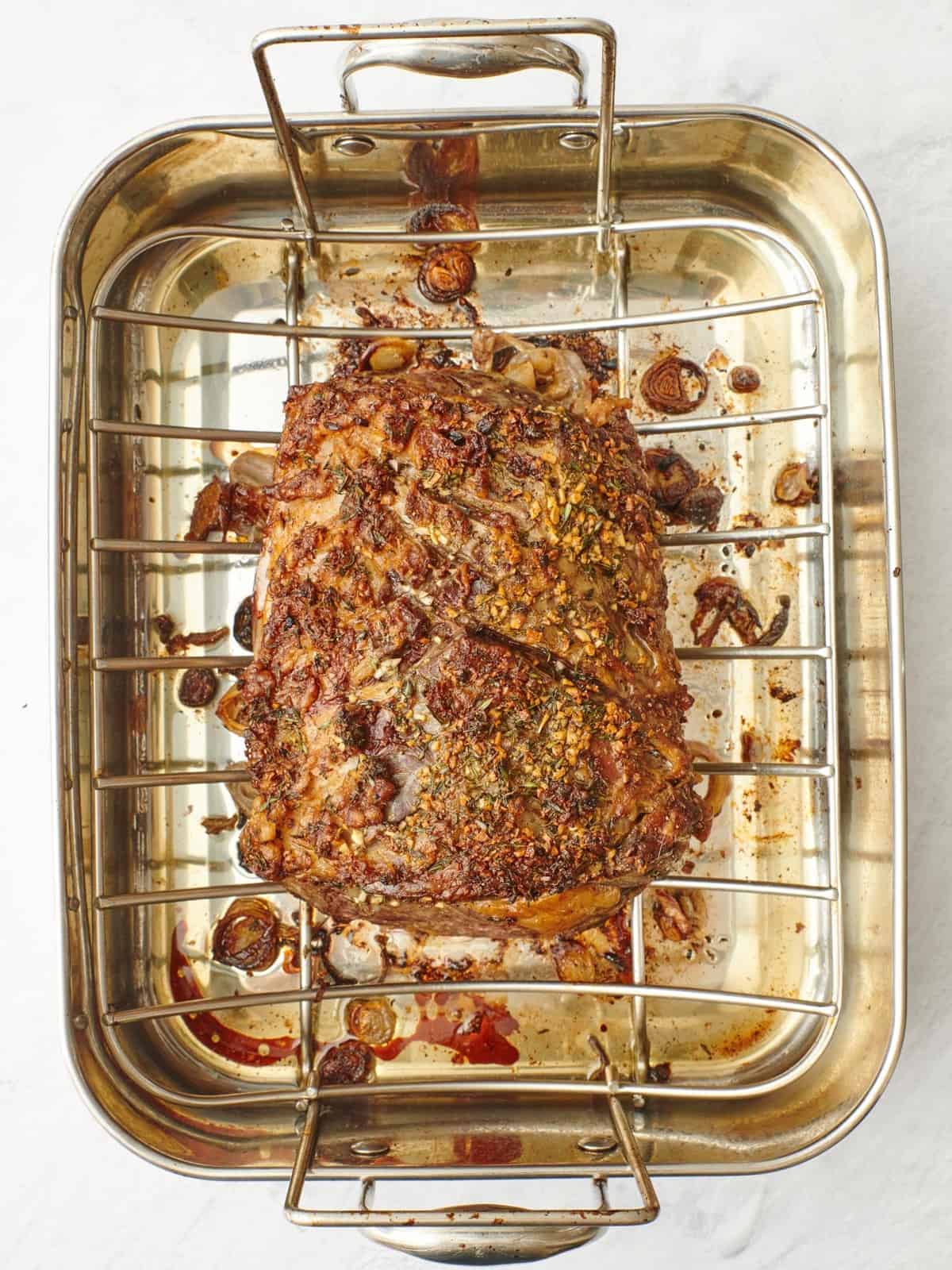
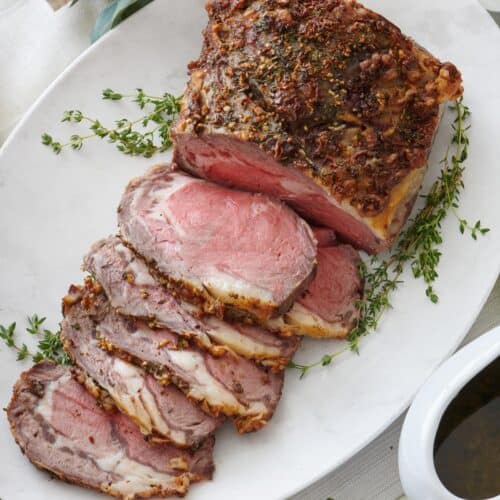
Garlic and Herb Crusted Prime Rib Roast
Ingredients
- 1 6 to 7 pound boneless rib eye roast
- 1 tablespoon kosher salt
- 6 tablespoons unsalted butter softened
- 6 garlic cloves minced
- 2 tablespoons fresh thyme leaves
- 1 teaspoon black pepper
- 4 shallots cut into thick slices
Instructions
- If your roast has a thick layer of fat (fat cap) on top, use a very sharp chef’s knife to carefully crosshatch the fat. Liberally season the roast all over with kosher salt, then place on a roasting pan or rimmed sheet pan and set in the fridge uncovered for 24 hours. This will allow the salt to penetrate the meat for maximum flavor.
- About 3 ½ to 4 hours before you would like to eat, remove the meat from the fridge and let it sit at room temperature for about 90 minutes.
- While the roast sits, mix the softened butter, garlic, thyme and pepper together. You want the butter mixture to be solid but easily spreadable.
- Preheat the oven to 500˚F with the baking rack set in the middle of the oven. Set the shallots in an even layer in a roasting pan. Set the roast on top and rub the butter mixture all over.
- Roast at 500˚F for about 15 minutes, or until the fat begins to render and brown. Reduce the heat to 325˚F and continue to roast for 14 to 16 minutes per pound, or until the internal temperature of the very center of the roast reaches 130˚F on an instant read thermometer for medium rare.
- Remove the roast from the oven and place on a carving board (you want something that will collect the juices) and tent with foil. Rest for at least 20 minutes before carving.
Notes
Nutrition
Nutrition information provided is an estimate. It will vary based on cooking method and specific ingredients used.
Recipe Tips
- Plan ahead. This prime rib recipe is simple, but it does require some advance planning. You’ll need to account for the 24 hours in the fridge, plus the 90 minute resting time before you even starting cooking your meat.
- Use a meat thermometer. This is the only way to know for sure when your prime rib is done cooking. Visual cues are great, but a thermometer is fail-proof! For medium-rare prime rib, aim for 130°F.
- Don’t serve your meat right away. Once your meat is cooked, don’t skip the resting time! Tent your prime rib with foil and let it sit for 20 minutes to allow the juices to redistribute in the meat, so they don’t all run out and leave you with a dry roast.
- Use a carving board if you can, not a cutting board. There’s a difference! A carving board has an area to catch any juices that may escape during carving. Cutting boards don’t have this feature, so you’ll be left with a mess to clean up.
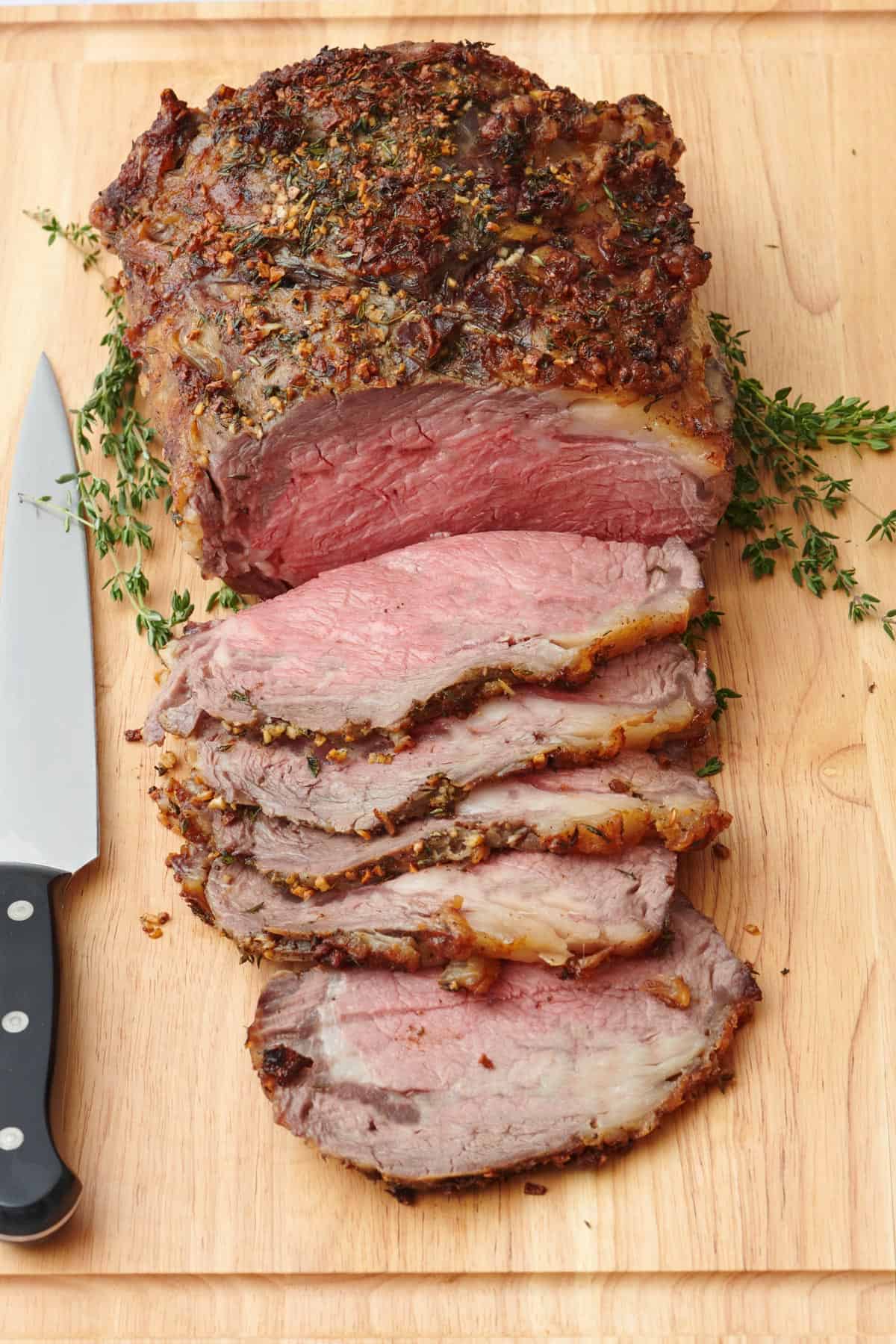
Serving Ideas
- Make a side salad. I love eating this prime rib with a kale and dried cranberry salad, or a classic Caesar salad.
- Pair with potatoes. Prime rib is great with lots of different potato dishes like fondant potatoes, baked potato wedges, or mashed potatoes. You can even drizzle au jus from your prime rib drippings on top!
- Add a veggie dish. I’d recommend my green beans with almonds or roasted Brussels sprouts.
FAQs
If you wrap your leftovers in foil or transfer them to an airtight container, they’ll last for 3 to 4 days in the refrigerator. To reheat, place your sliced meat on a baking sheet, cover with foil, and bake in the oven at 350°F until heated through. You can also heat individual slices in the microwave for about 30 seconds!
Yes, you can freeze this prime rib! Once cooled, place it in a freezer-safe bag or airtight container, and it’ll keep for up to 3 months in the freezer. To thaw, simply place it in the refrigerator overnight, then reheat according to the instructions above.
What should I do if my roast is cooking too fast or too slow?
Cooking times can vary due to several factors like the exact size of your roast, how long it was out of the fridge before cooking, or the true temperature of your oven. If your roast is cooking faster than you expected, you can lower the oven temperature by about 25°F and check the internal temperature frequently to prevent overcooking. On the other hand, if it’s cooking slower than anticipated, you can slightly increase the oven temperature. Always use an instant-read thermometer!
What temperature should prime rib be served at?
The ideal serving temperature for prime rib depends on your preferred level of doneness! For medium-rare, aim for an internal temperature of about 130-135°F. If you prefer medium, go for an internal temperature of 135-140°F. And for those who like it well-done, aim for an internal temperature above 145°F. Keep in mind that the roast’s internal temperature will continue to rise a few degrees after you remove it from the oven, so you may want to take it out a few degrees before it reaches your preferred temperature.
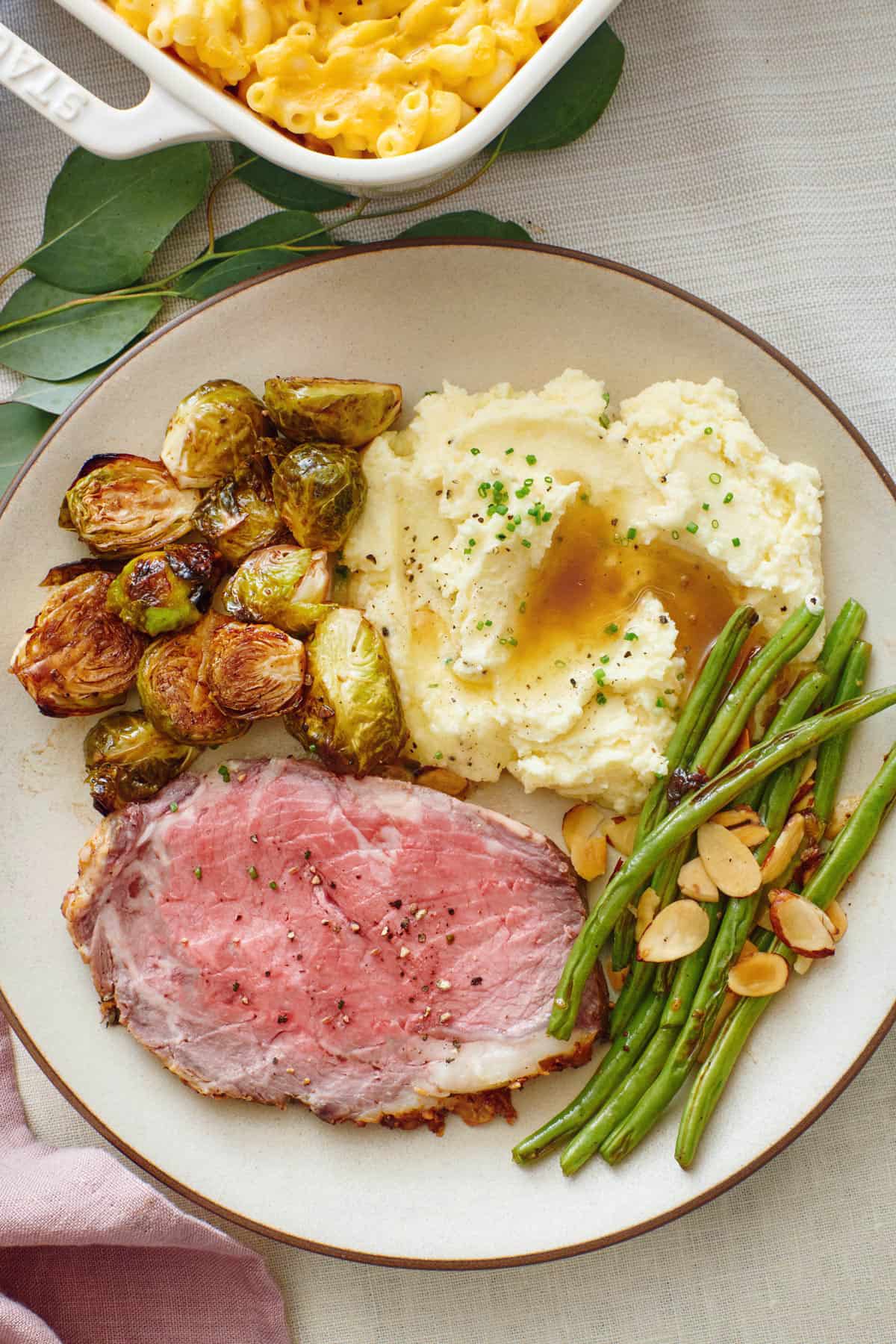
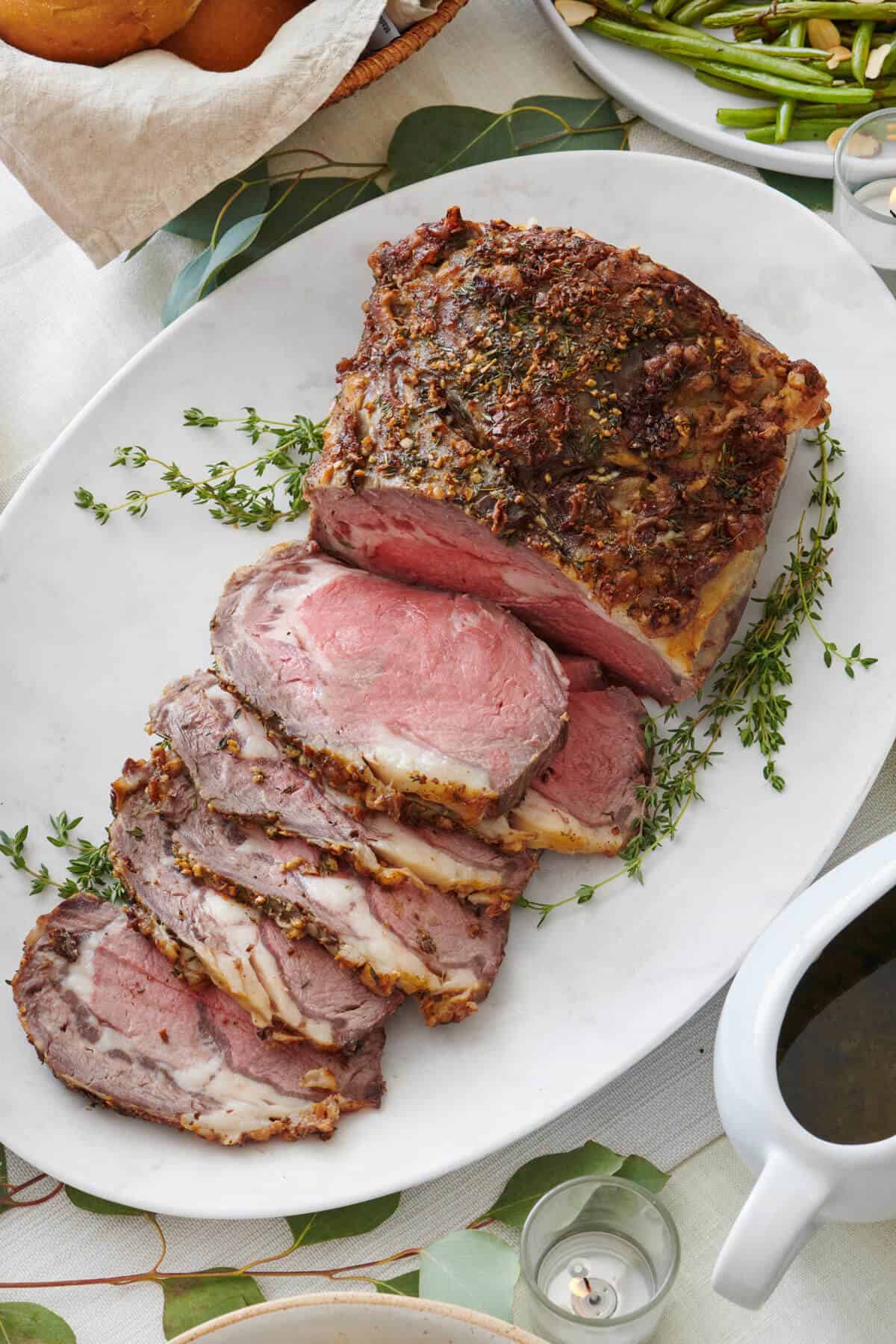






Comments
I’ve made rib roast using this recipe 3 years in a row and it’s always come out perfect. Absolutely delish. Well-seasoned, perfectly done and a great hit at my holiday dinner table.
Love that!! So happy it’s been a hit for your holiday dinners! Thank you, Tracy!
Quick question. Do you set your oven on “roast” or “bake”? Thank you!
Bake is fine for this application!
Made it last night. It was excellent. Just that my rib eye weighed 3.28pounds ie it was supposed to be in the oven for 48 mins excluding the first 15mins (500F), but it was just at 90F…so I had to cook it for another 30mins to reach 135F. What did I do wrong? My rib eye was not in the fridge for 2 hours.
Hmm, so you started with the meat at room temperature? Any chance it was frozen before cooking?
I bought it fresh, not frozen and yes, I took the meat out 2.5hours before cooking it. no worries. I am just curious…